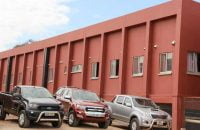The Jesuit Center for Theological Reflections has noted a reduction in the cost of living in Lusaka owing to a reduction in the price of essential foodstuffs.
In a statement released today, JCTR however, observed that the cost of living was still far above the average monthly urban income.
“The April 2017 JCTR Basic Needs Basket (BNB) for a family of five living in Lusaka stood at K4, 973.03 reflecting a K44.06 decrease from the March 2017 BNB of K5,017.09. The reduction in the April BNB is attributed to reduction in the cost of some food items such as beans which reduced from K40.1 to K30 per kg, dry fish reduced from K103.43 to K96.33 per kg, tomatoes from K6.33 to K5.33 per kg, onion from K11.61 to K8.5 per kg and non-food items like charcoal which reduced from K171.67 to K143.33 per 90kg bag,” read the statement.
“The reduction in food items is attributed to increased food supply as the harvest season begins. The April 2017 BNB however, shows an increase in the price of Kapenta from K181.05 per kg in March to K208.17 per kg in April. This has been attributed to scarcity of the commodity due to depletion of Kapenta species while demand has remained the same causing prices to rise.”
JCTR noted the cost of living in Lusaka still remained high above the average monthly urban income.
“The JCTR BNB has ranged between K4, 500 and K5, 300 in the past 4 months, this is far higher than the monthly urban average income of K3, 152.00 as estimated by the Central Statistical Office in the 2015 Living Conditions monitoring survey,” stated JCTR.
The Center observed that there was need for the government to secure decent work for people for sustainable socio-economic development.
“On 1st may, 2017 during the Labour Day celebrations President Edgar C. Lungu in his address is quoted as saying that the PF government attached great importance to the promotion and realization of decent work. He further went on to say that, government intended to create a minimum of 200,000 decent jobs on an annual basis in order to attain the goal of higher growth in employment,” JCTR noted.
“According to the 2014 Labour Force Survey, 83 percent of Zambians are in the informal sector and 17 percent in the formal sector. This implies that the majority of Zambian workers lack decent jobs as the informal sector is characterized by lack of access to social protection or social security and exploitation of workers’ rights. It is therefore essential that the government invests in creation of decent jobs to enable people earn a decent living.”












